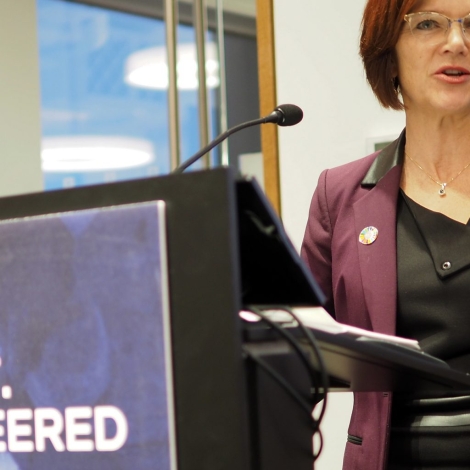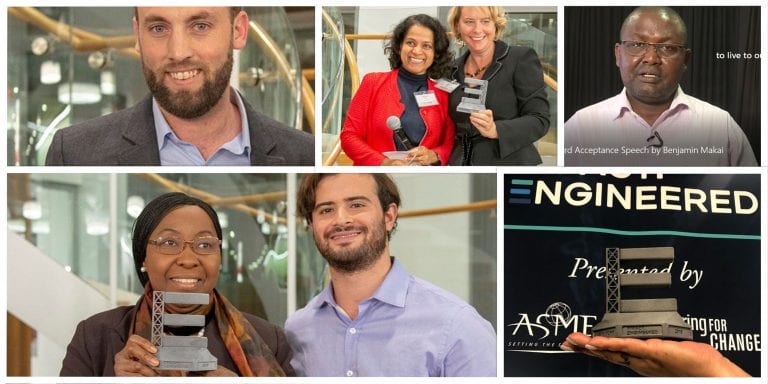The goals of economic development can seem daunting and often demand a laser focus to achieve results. That is true for the engineers and technology creators working to ensure that the world’s bellies are full, drinking water is safe, homes, clinics and schools are lit and connected, and everyone’s basic needs are met now and in the future. In the midst of that work it’s important at times to pause, breathe and draw inspiration from peers and leaders. On October 11 in New York City, two organizations convened experts and rising stars from around the world to recognize their talents and learn from their experiences. Engineering for Change and the American Society of Mechanical Engineers (ASME) hosted Impact.Engineered, a forum for discussion with some of the brightest minds in our field, and an awards ceremony to honor our heroes.
Two kinds of contrasts marked the event. One, the biggest names in the field of technology for global development and representatives of global development and design behemoths shared the stage with heads of newly launched startups and the field’s up-and-coming proteges. That was largely through strategic partnerships with World Bank, Autodesk, the hardware startup accelerator FutureWorks and others. Raj Nandy, Digital Strategy Officer at World Bank and Zoé Bezpalko, Design and Manufacturing Sustainability Strategy head at Autodesk, outlined their organizations’ responses to climate change. And FutureWorks supplied two graduates of its accelerator to the “Rising Stars” award to hardware startups: ELIA touchable print for the blind, and WearWorks, haptic guidance for the blind.
And the second contrast was the careful attention to the local engineering and design scene intermixed with guests from around the world. The venue, New York University’s Tandon School of Engineering, exemplified Brooklyn’s contribution to the field. Tandon’s Dean Jelena Kovačević said the school and Impact.Engineered share the goal of steering the engineering field toward positive social change. FutureWorks is another local pillar with a network of shops and maker spaces around the five boroughs of New York. ASME’s Innovation Showcase (ISHOW) drew international guests, inviting the finalists from events in countries on three continents, India, Kenya and the United States.
And the winners are
The awards recognized engineers’ role in solving global challenges. This year featured five categories, Hardware Trailblazer, Women Leading in Technology and Impact, Connecting the Unconnected, Companies Advancing the Sustainable Development Goals, and the Rising Stars of hardware entrepreneurship. These are the winners.
Hardware Trailblazer: Water Health International (Irvine, California, USA)
WaterHealth International provides safe drinking water technologies to underserved communities worldwide. The organization oversees more than 700 units in the field, impacting about 10 million people daily.
“Their technology and approach were ahead of the market, being ‘social entrepreneurs’ long before this category of businesses was in the public consciousness,” Paul Scott, ASME’s Director of Social Innovation, says.
Women Leading in Technology and Impact: Mariana Costa Checa, Laboratoria (Lima, Peru)
Mariana Costa Checa heads Laboratoria, a social enterprise that equips women with the digital skills they need to thrive in technological fields. With centers in Peru, Chile, Mexico and Brazil, Laboratoria trains thousands of young women from underserved communities, teaching them to work as software developers and placing them in jobs where they get to transform their lives.
“With organizations like Laboratoria, there should be no excuse for not being able to ‘find’ women to hire. I really applaud Mariana and her team for this amazing and very relevant work,” says Linda Raftree, an ICT consultant and Impact.Engineered judge.
Connecting the Unconnected: Gram Marg (Mumbai, India)
The Indian Institute of Technology Bombay (IIT Bombay), in Mumbai, India, launched Gram Marg as a project to improve Internet and other communications technology access in underserved communities. Gram Marg innovates technology to exploit unused TV White Spaces and unlicensed 5.8 GHz Wireless, and seeds the growth of community networks, multi-stakeholder partnerships, and in-depth impact assessment studies of how connectivity has changed the lives of people in the remote, rural villages of India.
Companies Advancing the Sustainable Development Goals: ARUP (London, United Kingdom)
The global engineering giant Arup has prioritized the UN’s Sustainable Development Goals as reference points for all of its projects. Arup aims to enable everyone at the company to understand not only the economic, but also the social and environmental impact of their work.
“While many other responsible companies also align their work with the SDGs, Arup does even more: they have established their own non-profit business. An entity that partners with humanitarian and development organizations and assists them in optimizing the use of their resources to combat poverty and inhumane living conditions and to raise resilience and wellbeing,” says Carola Schwank, head of Siemens Stiftung’s Empowering People Network and Impact.Engineered judge.
Rising Star: Bitae Technologies (New York, NY, USA)
Bitae Technologies developed a “Digital Backpack” as a means for refugees and other vulnerable populations to carry their skills and experience with them in a secure, verified portfolio. The social venture calls it a “digital CV for the 21st century.” The backpack supports Bitae’s work to build human capital, self-reliance and transferable skills for a generation of global, mobile talent. Bitae’s representatives say that everyone should have access to education, work and opportunities regardless of the borders that surround them.
Posted Notes from Impact.Engineered
All are welcome to the annual event, but for those who could not attend this year, we are glad to provide a glimpse through photos and moments posted to social media. Please scroll through the selection of media below and join the conversation with your comments at the bottom.
A lot of tech that can solve problems in underserved communities is already invented & in use in those places. No need to build something new in Silicon Valley or Cambridge. Instead we should document what exists & support its use – Chantal Carpenter @UNCTAD #ImpactEngineered
— Engineering for Change (@engineer4change) October 11, 2018
I couldn’t resist hightlighting another @engineer4change fellow Abir Chermiti who is a rockstar in her research! #ImpactEngineered #DayoftheGirl pic.twitter.com/3Ik5yhot0L
— Jana Melpolder (@JanaMelpolder) October 11, 2018
“We grabbed some banana, some coconut, some pineapple & we put it in a blender & poured coca cola on it to see which was most absorbent.” The winner was banana fiber. – Connie Lewin at @SHEnterprises describing the prototyping process for their sanitary pads. #impactengineered
— Engineering for Change (@engineer4change) October 11, 2018
Bootstrapping tip: low-cost aluminum machining may cost less than 3D printing for prototypes. – @amoswinter / #impactengineered
— Engineering for Change (@engineer4change) October 11, 2018
“Don’t think design constraints for the developing world – instead, identify design freedoms.” @amoswinter #ImpactEngineered @engineer4change @ASMEdotorg pic.twitter.com/VQtMTe4EdM
— Holly SchneiderBrown (@HollySBrown1) October 11, 2018
Top 2 takeaways from the “Disrupt Engineering Education” panel:
✔️ Teach your students that they will also work with anthropologists, ethnographers, and more
✔️ Plug your students into projects that are multi-year so private organizations can easily participate#ImpactEngineered— Jana Melpolder (@JanaMelpolder) October 11, 2018
“People’s lives are at stake and they don’t have time to waste on an experiment.” – @VanessaGrellet_ at @consensys on the risk of trying new tricks with blockchain in global development. #impactengineered
— Engineering for Change (@engineer4change) October 11, 2018

